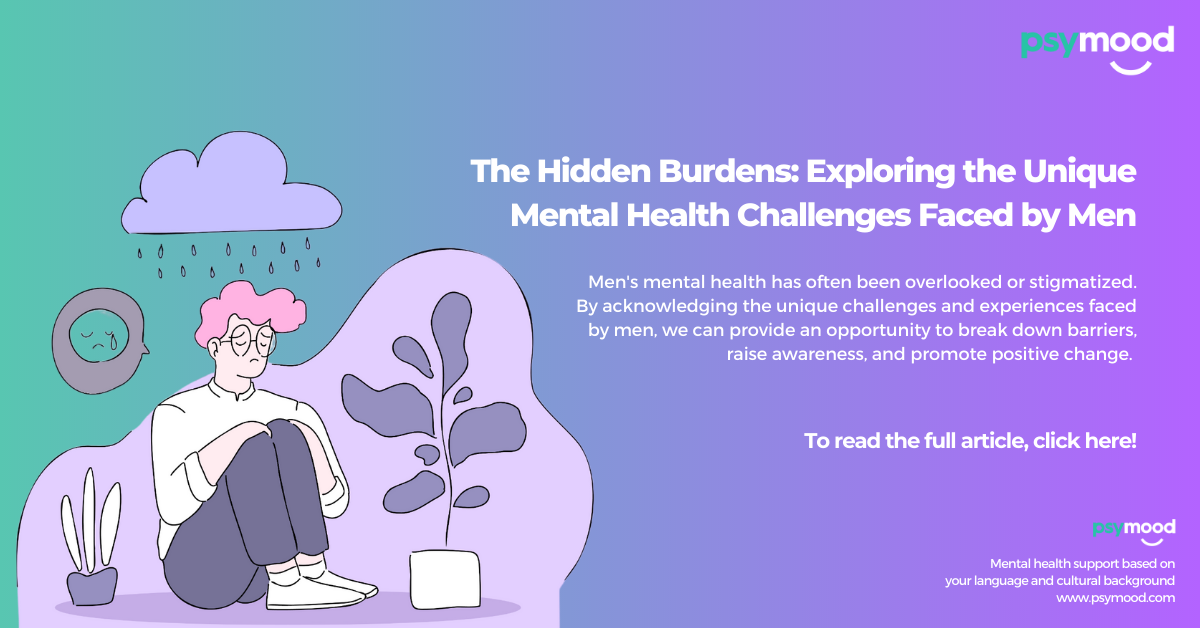The Hidden Burdens: Exploring the Unique Mental Health Challenges Faced by Men
Robin Williams once said, “And remember, suicide is a permanent solution to a temporary problem”. Robin is one of many men who struggled with their mental health and sadly took their own life. These topics are never easy to talk about, but June is Men’s Mental Health Month. It is a time we shed light on the mental health faced by men and how the societal stigmas that are engraved pave the way to mental health struggles.
In a society where men’s mental health has often been overlooked or stigmatized, it is important to acknowledge the unique challenges and experiences faced by men. This month provides an opportunity to break down barriers, raise awareness, and promote positive change.
Within this blog, we will look at how men are affected by mental health and the stigmas created by society, as well as how those stigmas are even more present within different cultural communities.
Men’s Mental Health, How Is It Different?
Men may experience mental health differently due to various factors, including societal expectations, stigmas, and gender-specific challenges. Men also may face unique stigmas and stereotypes surrounding mental health, perpetuating the belief that seeking help is a sign of weakness. That, plus the limited emotional expression, can hinder their ability to recognize and address their mental health needs effectively.
Culture and Mental Health
Cultural norms also play a huge role in men’s mental health as they often dictate that men should be strong, self-reliant, and unemotional, which can create barriers to seeking help and expressing emotions. Moreover, the constant pressure to conform to traditional masculinity can lead to the suppression of feelings and difficulties in addressing mental health concerns openly, this pressure is even more prevalent in different cultures.
Different cultures have varying expectations of men’s behaviour, emotions, and roles within society. Many cultures view masculinity as being based on strength and emphasizing stoicism. And when men speak out about their emotions, it can be seen as a sign of weakness, leading many men to avoid seeking help.
Many cultures still see mental health as being a taboo topic and will often avoid talking about it. Cultural attitudes and beliefs surrounding mental health can contribute to stigmatization and discrimination, which may prevent men from seeking help or disclosing their struggles. In some cultures, mental health issues may be seen as a personal weakness or a family shame, leading to secrecy and isolation.
Men from immigrant backgrounds or marginalized communities often face unique challenges related to cultural identity and acculturation. Balancing multiple cultural identities, navigating between different cultural norms, and dealing with the pressure to assimilate can have an impact on their mental well-being.
How We Can Support Men’s Mental Health
Supporting men’s mental health is crucial in creating a society that values the well-being of all individuals. We need to move towards a future that fosters environments that promote open dialogue and challenge societal norms and expectations. This can be achieved by creating safe spaces for men to talk and learn more about mental health and have access to resources that can help them thrive.
Additionally, developing culturally responsive services that take into account the unique values, beliefs, and experiences of different cultures. Cultural factors such as language, religion, and cultural beliefs about mental health and healing should be considered to provide appropriate and sensitive care. These are vital steps toward ensuring the well-being of men worldwide.
Final Thoughts
It is important to acknowledge and address the unique experiences men experience to ensure that mental health services and support systems are inclusive and responsive to the needs of men. By challenging stereotypes, promoting open dialogue, and creating safe spaces for men to seek help without judgment, we can help bridge the gap in mental health support and promote overall well-being.
PsyMood is a digital tool designed to help you find the support you need in the language that you are most comfortable with. PsyMood considers cultural background, geographical location, interests, and personal needs, amongst other factors, to pair you with service providers for either online or in-person therapy sessions.
For More Interesting Posts
You may also be interested in learning more about Eating Disorders Don’t Discriminate: Men and Eating Disorders, Men’s Health in Movember, Men’s Mental Health – Breaking the Stigma, and Men’s Mental Health & Cultural Taboo – Session Highlights.


.png)
.png)
.png)
Recent Comments